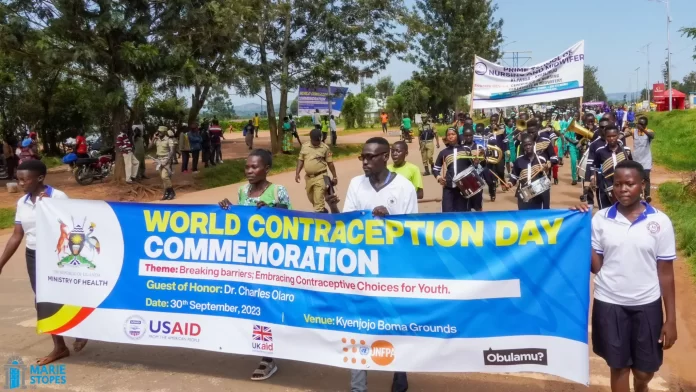Health activists in Kyenjojo have called for more action by government to contain the growing wave of teenage pregnancies in the country.
This follows reports by the Ministry of Health (MOH) showing that Kasese is leading in the country with over 7,000 teenage pregnancies, ahead of Kyenjojo with 4,000 young girls.
According to the Ministry of Health and Kyenjojo District officials, Kasese district still has high numbers of young girls below the age of 18 years, engaging in sex due to poverty, domestic violence and peer pressure, and bad cults which cause pregnancy.
These remarks were made at a function to commemorate World Contraception Day on September 30, 2023, in Rwenzori region.
Joselin Mbabazi Olim, the Senior Probation Officer of Kyenjojo district, under the UNFPA, Ndejje recorded 4341 cases of teenage pregnancies. Out of that, 64% of the girls have sex before they turn 18 years while 34% get married before the age of 14.
“We also have cases of defilement and in fact, we have been having cases of incest in the district, fathers sleeping with their girls and this is caused by domestic violence,” she said.
Samuel Balamaga, the Partner Representative for Ministry of Health said that, there is a need to improve the use of contraceptives mainly to prevent unintended pregnancies.
“There are very many cases of young girls getting pregnant at an early age. We came to this region to create awareness. That’s why I have called upon different players including the district officials, religious leaders, cultural leaders, parents and students in tertiary institutions to create awareness and to remind them about the need of preventing our young girls from becoming pregnant,” he said.
Dr. Charles Olaro, the Director of Health services at MOH said that, the role of the ministry is to give them the right information so that they use them in the right way, adding that, married couples improved from 30.4% to 37% use of contraception.
“We need to follow up with these teenagers so that they do not get a 2nd pregnancy. We need to inform them and give them access to contraception,” Olaro added.
According to the report, one in four (25 percent) girls in Uganda aged 15-19 years, have had a child or are pregnant. 34 percent of Ugandan girls by 18 years are married. 28 percent of maternal deaths occur among young girls (15-25years).















